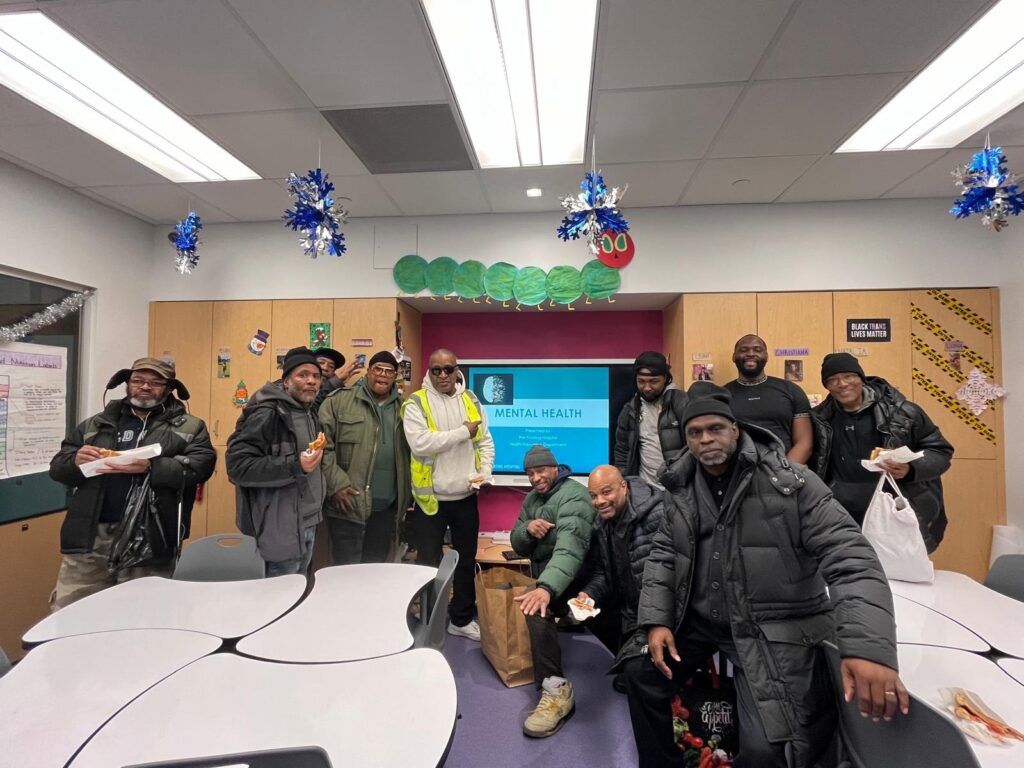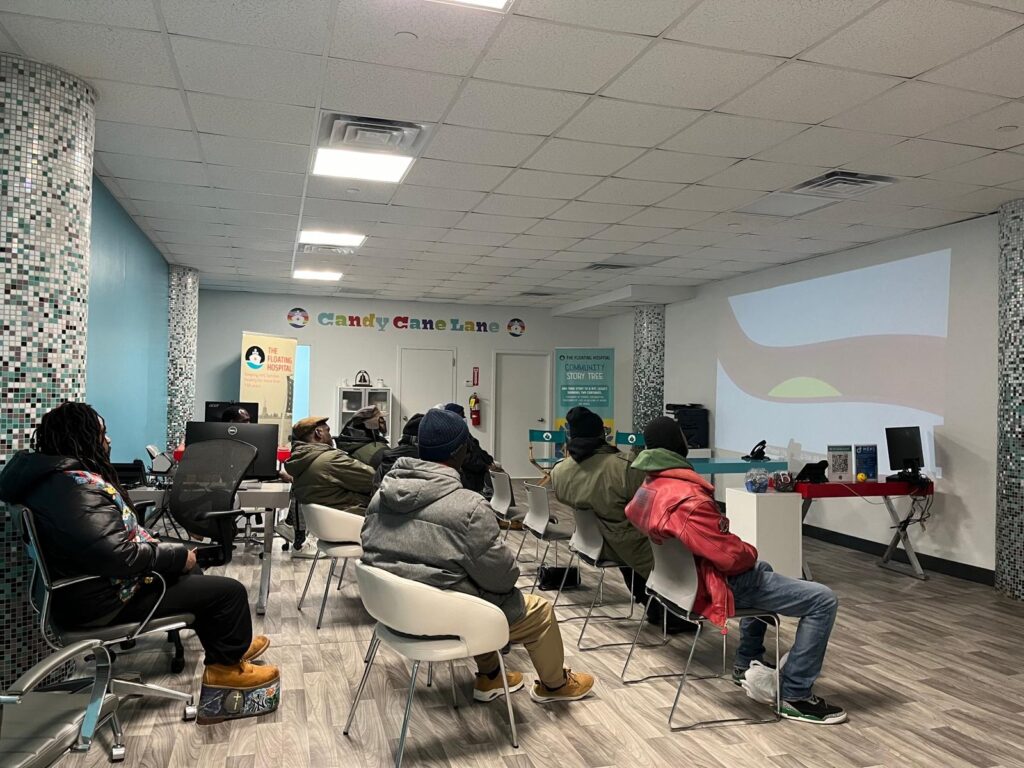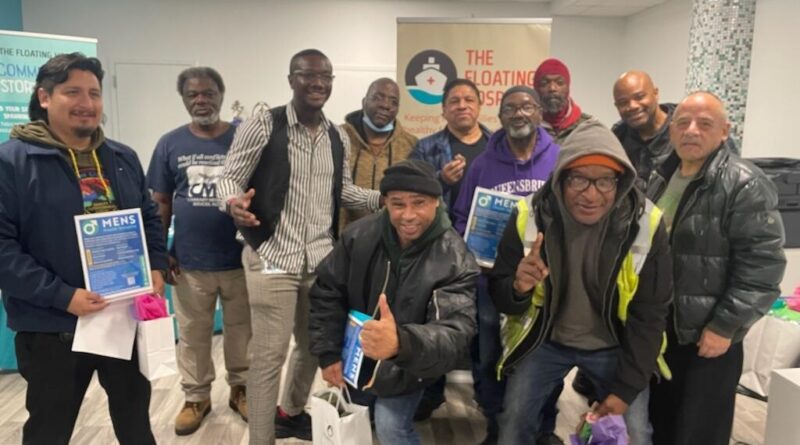The Floating Hospital Workshops Give Queensbridge Men Safe Space to Talk Health
For many men, discussing the topic of their health, both physical and mental, is best kept as a private matter.
A new program of The Floating Hospital, however, is working to change that perception for some adult men from NYCHA’s Queensbridge Houses and the surrounding community. Partnering with NYCHA, the nonprofit Floating Hospital – which operates the Queensbridge Health Center at the development – has begun offering a series of free workshops focused on men’s health issues, held at the clinic’s neighboring Community Outreach Center.
The men-only group, which meets on Tuesdays once per month, has given participants the opportunity to discuss and learn about topics such as healthy living and nutrition; mental health; balanced masculinity; heart health; common illnesses in men; and positive parenting. The workshops started with an initial series from November through April and are expected to continue with another monthly schedule in the fall. An initiative of The Floating Hospital’s Health Education Department, led by Dr. Meghan Miller, the sessions are open to NYCHA residents from across the city.
As Men’s Health Month brings such issues to the forefront in June, Shaquille Grant, Life Skills Social Worker at The Floating Hospital, said the new group workshops are providing an outlet for men to share their thoughts and feelings about health-related concerns in a safe setting.
“It’s created a safe space for them, where even though they might be going through some problems, they’re still able to communicate about it,” said Mr. Grant, who facilitates the program. “I feel it’s very much needed, and it’s something that a lot of them didn’t even realize they needed.”
Jeralyn Cortez-Weir, Health Care Partnership Manager in NYCHA’s Resident Health Initiatives Department, said: “It is exciting to hear about the success of the men’s health group at The Floating Hospital. The needs and interests of men are being heard and acknowledged. This is a model that should be expanded to reach additional NYCHA communities.”
Bill “Moose” Robinson, a former longtime resident of Queensbridge North Houses who works in the community, was immediately intrigued when learning of the program and encouraged some of his friends to join him at the meetings.
“I thought this forum was an excellent idea because men can come, let whatever that is inside them out, and we can get some assistance to try to solve the problem,” Mr. Robinson said. “I was really surprised that a couple of the guys that I brought here opened up like they did. They were airing out a lot of the things that were on their chest.”
Lifelong Queensbridge Houses resident Darrein Webster was among those who were pleased to see a platform established for men to not only ask questions and learn about health and wellness, but also to open up about issues on their mind.
“What really interested me is that it’s a place for us to really get some good information and talk to some people about what was going on, what we felt, and why we felt it,” Mr. Webster explained. “I was so glad that something was finally brought to the community because we need this in the community.”
Fellow workshop attendee Perry Crosby agreed that the forum has been a welcome space for men in the Queensbridge neighborhood: “It’s about time for us to pull together as men and have this awareness to bring to the table in our community. Programs like this are collectively constructive for us.”


The Floating Hospital began its new men’s health program in the Queensbridge Houses community with a monthly series of workshop topics ranging from mental and heart health to balanced masculinity and positive parenting.
Among the various topics of discussion, Mr. Webster said he was drawn to the workshop on common illnesses, which addressed some of the most dominant forms of cancer in African-American men, possible contributing factors for diseases, and how to access resources. Other subjects that received particular interest from some participants were mental health and nutrition, including how certain foods can impact one’s health.
“This group has been great for me; it has made me so much more aware of my health, and I’m so into health now,” Mr. Webster said.
Mr. Grant believes the sessions have been beneficial by creating a sense of community and fostering inclusiveness for those involved. While much of the conversations can be personal and sensitive, Mr. Grant said he aims to ensure a supportive environment where the men can feel heard without judgment.
“I want to make sure that everyone feels welcome so they’re able to speak about their problems freely without being judged,” he noted. “We want to make sure they feel free to be who they want to be and speak the way they want to speak.”
In addition to the rapport developed between the group members, some of the men have found it helpful to know that others may have similar challenges or concerns.
“When you’re talking in the group, you find that you’re not alone,” Mr. Webster said. “We’re throwing our situations at each other, and we’re getting help from one another. It has created this platform for us to get to know each other and to know that we’re all in this struggle together.”
Moreover, the sincere conversations that come about have led Mr. Webster and other members to feel comfortable being vulnerable, expressing their emotions, and letting their guard down.
“You are able to feel free as a man that there’s nothing to be ashamed of,” Mr. Robinson explained. “I feel more comfortable opening up about certain things and relating to other men that also have things on their mind. It’s really been a good thing and it helps a lot.”
The men’s group sessions saw a noticeable jump in participation in the six months since the workshops began, as members spread the word about the impactful health forum, according to Cynthia Davis, Director of Community Outreach at The Floating Hospital.
“It popped off really nicely and I’m impressed how it grew,” she said, adding that participants are also using the visits to make various medical appointments at the Queens clinic. “It’s a wonderful feeling to see them come in and make appointments to use our services.”
The prospect of future workshops comes as welcome news for those who have been attending, who say they have much more to discuss and are eager to continue the conversations.
“Sometimes we get into it so deep and for so long that we go past our time,” Mr. Robinson said. “We all got something out of it, and we can’t wait until the next one.”
For information on joining the Queensbridge men’s health workshops, email cdavis@thefloatinghospital.org or call (718) 784-2240 ext. 273.
Have a question or idea about health partnerships at NYCHA? Email health.initiatives@nycha.nyc.gov.

